Catch up on the events that kept the Faculty buzzing in October
The momentum that kicked off the school year with three major conferences in September continued last month at the Faculty of Law. In addition to the September conferences on the legal institution of the trust; on interdisciplinarity and the ideas of Claude Levi-Strauss; and on sustainability in air transport, October kept up the pace with two more conferences and a slew of talks, discussions and panels.
Besides these five major events spanning three busy weeks, the Faculty’s various conference facilities also played host to numerous public lectures, a seminar on environmental consultation, an event launch for a human rights NGO, a graduate student retreat and a continuing legal education lecture accredited by the Barreau du Québec and the Chambre des notaires du Québec.
A recap of select events follows, while the November edition of inFocus online features the graduate student retreat and the Continuing Legal Education lecture at greater length.
ius commune
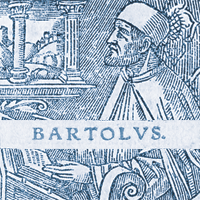 The month opened with a conference on ius commune – a body of legal principles derived from Roman law that emerged in the High Middle Ages in Europe. Participants jammed the handsomely furnished Stephen Scott Room on a warm Friday afternoon to catch four legal historians presenting on their recent work on the subject.
The month opened with a conference on ius commune – a body of legal principles derived from Roman law that emerged in the High Middle Ages in Europe. Participants jammed the handsomely furnished Stephen Scott Room on a warm Friday afternoon to catch four legal historians presenting on their recent work on the subject.
Said Professor Helge Dedek, who organized the event:
The topic “ius commune” is of particular relevance to three aspects of scholarship and pedagogy to which McGill has been traditionally highly committed: the latest international developments in comparative law (the lode star of the historical “ius commune” is frequently invoked in current European harmonization projects); the elucidation and preservation of the Civilian tradition (which is rooted in the “ius commune”); and transdisciplinary endeavours, in this case, the collaboration between scholars of law and of History.”
Accordingly, the event was sponsored by the Montreal EU Centre of Excellence, the Wainwright Fund and the Institute for the Public Life of Arts and Ideas (IPLAI).
The success of the event stands witness to the intellectual curiosity of the McGill community. Prof. Schermaier, visiting from Germany, observed: “It’s unbelievable that a seminar on legal history draws such a crowd on a Friday afternoon!”
Second Echenberg Family Conference
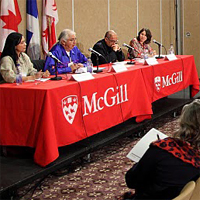 The Echenberg Conference on Human rights and Diverse Societies (October 7 – 9) brought together scholars, policy-makers and activists for a weekend of discussion about the relationship between human rights and multiculturalism. Are human rights universal? Can education help combat hatred and prejudice? What cast do media give to stories about human rights? Where can we go from here?
The Echenberg Conference on Human rights and Diverse Societies (October 7 – 9) brought together scholars, policy-makers and activists for a weekend of discussion about the relationship between human rights and multiculturalism. Are human rights universal? Can education help combat hatred and prejudice? What cast do media give to stories about human rights? Where can we go from here?
Human rights luminaries such as Malailai Joya, the outspoken former Afghan Member of Parliament, and Marie Wilson, of the Canadian Truth and Reconciliation Commission, and Faith Pansy Tlakula, Chief Electoral Officer of South Africa joined the participants on panels, in question and answer sessions and for coffee over the course of the three-day conference.
Young Leaders Forum
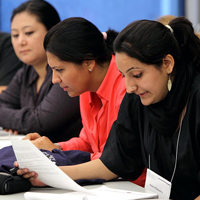 The 2010 Echenberg Conference also included the International Young Leaders Forum (October 4 – 7), during which 25 young professionals and scholars from 23 countries on five continents spent the week engaged in dialog examining their role as human rights defenders.
The 2010 Echenberg Conference also included the International Young Leaders Forum (October 4 – 7), during which 25 young professionals and scholars from 23 countries on five continents spent the week engaged in dialog examining their role as human rights defenders.
The Forum opened in a burst of colour and creativity as participants tried their hand at creating elaborate dreamcatchers under the guidance of artist and facilitator Nick Huard. The young leaders participated in workshops on Indigenous Peoples, diversity and multiculturalism, journeyed out to Kahnawake Mohawk Territory and, on the final day of the Forum, drafted and presented a charter addressing human rights and diversity.
You can follow their continued discussions on their blog at Echenberg Human Rights Fellows.
Boaventura de Sousa Santos, “The Epistemologies of the South: Reinventing the State, Democracy and Law”
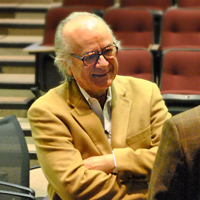 Renowned thinker Boaventura de Sousa Santos, who is also one of the primary leaders of the World Social Forum, closed the Echenberg Conference proceedings by encouraging participants to re-examine the beliefs that underlie the concept of human rights; he emphasized the urgency of this message again two days later when he delivered a lecture in the Moot Court challenging implicitly understood parameters of international law such as state and democracy.
Renowned thinker Boaventura de Sousa Santos, who is also one of the primary leaders of the World Social Forum, closed the Echenberg Conference proceedings by encouraging participants to re-examine the beliefs that underlie the concept of human rights; he emphasized the urgency of this message again two days later when he delivered a lecture in the Moot Court challenging implicitly understood parameters of international law such as state and democracy.
“We can’t achieve social justice without a revisioning of epistemologies of knowledge,” he said, arguing for the need to recognize that there is no general theory that can encompass the inexhaustible and infinite diversity of the world. “We need to decolonize the political, social and legal imagination… Our understanding of the world by far exceeds Western understanding of it. This is easy to say but difficult to exercise.”
Workshop with Professor Constance Backhouse
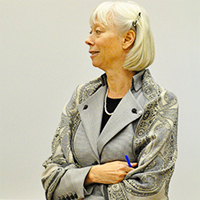 Calling it “Canada’s first capital-L lesbian sexual assault trial,” University of Ottawa Law professor Constance Backhouse recounted the details of a sexual assault trial that took place in Yellowknife in 1955. Backhouse told the story of the initial conviction and successful appeal through the eyes of Willimae Moore (the accused) and Beatrice Gonzales (Moore’s companion), peppering the story with details about the games of Scrabble over which an attraction developed, the attempted kiss and an impassioned letter that formed the basis of the assault accusation.
Calling it “Canada’s first capital-L lesbian sexual assault trial,” University of Ottawa Law professor Constance Backhouse recounted the details of a sexual assault trial that took place in Yellowknife in 1955. Backhouse told the story of the initial conviction and successful appeal through the eyes of Willimae Moore (the accused) and Beatrice Gonzales (Moore’s companion), peppering the story with details about the games of Scrabble over which an attraction developed, the attempted kiss and an impassioned letter that formed the basis of the assault accusation.
As she concluded the lecture, Backhouse also shared with the rapt audience her own astonishing discovery that Moore was black. “I study race in legal history and I just assumed everyone was white because it was in Yellowknife,” she said to gasps and laughter. “The joke was on me!”
Backhouse’s lecture was part of the Annie Macdonald Langstaff workshop series, specifically the Patrician Allen Memorial Lecture, created to honour Allen, an alumna who was murdered in 1991.
The next Annie Macdonald Langstaff workshop, co-sponsored by IPLAI, is an exploration of the ‘public sex’ of the judiciary, and takes place at the Faculty of Law on Friday, November 12 at 12:30.
To find out more about upcoming lectures and events, see the Faculty’s Events Calendar.
